In the late 1970s, a contestant on The Price is Right walked away with what looked like a simple door prize. Decades later, that very prize has resurfaced at Bob’s Watches — and it happens to be the Tiffany & Co. Rolex Submariner Ref. 1680. Known as one of the rarest vintage Rolex Submariners ever made, this piece combines Tiffany dual-signature branding, full provenance, and cultural significance.
The watch in question is a 1978 Rolex Submariner Ref. 1680, remembered as the first Submariner to include a date display. More importantly, this example stands out because of the Tiffany & Co. co-branding on the dial. Collectors value such dual-signed Rolexes for both rarity and cultural importance.
Why this Tiffany & Co. Submariner matters
- First Submariner model with a date window (Ref. 1680).
- Tiffany & Co. dual-signature, among the most desirable Rolex features.
- Provenance linked directly to a U.S. game show prize.
- Daily use by the original owner, adding authenticity to the story.
As Paul Altieri, CEO of Bob’s Watches, explained:
“It’s not just the rarity of the Tiffany dial, it’s the story. A game show prize became a cherished daily companion — and now, a world-class collector’s piece.”
Rolex collecting in numbers
Since 2010, Bob’s Watches has completed over 50,000 Rolex transactions. During the same period, Tiffany-signed Rolexes have increased in collector value by more than 35%. Furthermore, auction houses confirm record-breaking demand for dual-signed dials.
Q&A: Collectors want to know
Q: Why are Tiffany-signed Rolexes so valuable?
A: Dual-signed dials are rare because only a few retailers had this partnership. As a result, Tiffany-branded Rolexes enjoy even greater desirability.
Q: How can you authenticate a Tiffany Rolex?
A: Collectors should check correct serial ranges, dial printing consistency, and period-specific details. In addition, Bob’s Watches subjects each watch to strict authentication.
Q: What sets this Submariner apart from others?
A: Its unique story — a U.S. game show prize worn daily before entering the collector’s market. Consequently, it blends American pop culture with Rolex heritage.
Industry expertise and recognition
Bob’s Watches is widely known as the leading pre-owned Rolex marketplace in the United States. Through a transparent buy/sell model, rigorous authentication, and an educational approach, the company has built trust with new buyers and seasoned collectors alike.
Altieri added:
“We see ourselves as caretakers of history. Our responsibility is not only to authenticate and preserve but also to share the stories that make each Rolex unique.”
Suggested Reading:
If you’re interested in the history of Rolex co-branding, you can also explore the guide on Understanding Rolex Dial Variations.
For collectors focused on provenance, the article on How to Authenticate a Vintage Rolex provides a step-by-step approach.
And if you’re drawn to the cultural side, don’t miss the feature on Rolex Watches in American Pop Culture.
This comprehensive gemology FAQ covers everything about studies, specializations, careers, and tools in the field. Whether you’re considering gemology education or exploring career opportunities, this guide answers the most frequently asked questions about becoming a professional gemologist.
1. What is Gemology?
Gemology is comprehensively defined as the scientific study of gemstones. This fascinating field encompasses their intricate identification, precise grading, geographical origins, various treatments, and ultimate valuation. Through dedicated study, individuals learn to meticulously differentiate between natural, synthetic, and imitation stones.
2. Why Should You Study Gemology?
Studying gemology offers a wealth of professional advantages. Crucially, you will acquire essential skills applicable across diverse sectors such as jewelry retail, prestigious auction houses, and specialized laboratories. Furthermore, this expertise empowers you to advise clients with unparalleled authority, thereby fostering trust. Ultimately, a strong gemological foundation serves as a vital safeguard against potential fraud, protecting both yourself and your clientele.
3. Main Areas of Specialization in Gemology
The field of gemology branches into several distinct and vital specializations, allowing for focused expertise.
Diamond Grading
One prominent area is diamond grading, where the focus meticulously centers on the renowned 4Cs: cut, color, clarity, and carat weight. Here, students become adept at understanding the rigorous grading systems employed by leading laboratories, such as the Gemological Institute of America (GIA).
Colored Gemstones
Another significant specialization involves colored gemstones. This area demands extensive study of iconic gems like rubies, sapphires, and emeralds, alongside hundreds of other vibrant stones. Critically, understanding how geographical origins profoundly influence a gem’s ultimate value is a core component.
Pearls
The study of pearls constitutes another specialized path. Students learn to distinguish between natural, cultured, freshwater, and saltwater pearls, each with unique characteristics. Consequently, comprehending how nacre quality directly impacts a pearl’s market price becomes paramount.
Gem Treatments
Detecting gem treatments is a highly technical specialization. This involves identifying various enhancements such as heat, irradiation, oiling, and fracture filling. Moreover, recognizing how these treatments significantly impact a gem’s market value is a crucial skill for any gemologist.
Synthetic and Lab-Grown Stones
The specialization in synthetic and lab-grown stones focuses on differentiating these from their natural counterparts. Therefore, learning to spot subtle indicators like specific growth patterns or distinctive inclusions is essential for accurate identification.
Gem Trade and Valuation
Finally, gem trade and valuation represent a specialization focused on the commercial aspects. Here, students delve into pricing strategies relevant to both local and global markets. Additionally, studying how demand fluctuates over time provides critical insights into market dynamics.
4. Courses and Qualifications That Matter
Pursuing formal education is key to a successful gemological career, with several qualifications holding significant weight.
Global Diplomas
Globally recognized diplomas are particularly impactful. The GIA Graduate Gemologist (GG) certification is highly esteemed, as is the FGA (Fellow of the Gemmological Association of Great Britain).
Advanced Lab Certifications
For those aiming for high-level laboratory work, advanced certifications from institutions like SSEF, Gübelin, and HRD are invaluable. These courses provide specialized, in-depth knowledge crucial for cutting-edge analysis.
Local Courses
While local courses can be helpful for beginners to gain foundational knowledge, it is generally understood that global diplomas carry considerably more professional weight and recognition within the industry.
5. Duration of Gemological Studies
The commitment required for gemological studies varies significantly depending on the chosen program. Short courses, for instance, might only last a few weeks, offering a quick introduction. Conversely, comprehensive diploma programs typically extend from six months to two years, providing in-depth training. Specific modules, such as those focused solely on diamond or pearl grading, can often be completed within a matter of weeks, allowing for targeted skill development.
6. Tools You Will Learn to Use
Mastering specialized tools is fundamental to effective gemological practice. Among these, the microscope is indispensable for meticulously examining inclusions, which act as fingerprints of a gem’s formation. Similarly, a refractometer accurately measures the refractive index, a key optical property aiding identification. A polariscope helps determine a gem’s optic character, revealing its internal crystal structure. Furthermore, a spectroscope is used to analyze absorption patterns within a gem, providing clues about its chemical composition and potential treatments. Lastly, an ultraviolet lamp is crucial for observing fluorescence, another diagnostic characteristic.
7. Career Options After Gemology
A qualification in gemology opens doors to a diverse range of career paths. Many graduates find fulfilling roles as jewelry retail professionals, guiding customers with expert knowledge. Others excel as diamond or gemstone graders in renowned laboratories. Opportunities also exist as auction house cataloguers, meticulously documenting precious items. Moreover, becoming a wholesale gemstone buyer requires keen market insight and negotiation skills. For those seeking independence, working as an independent appraiser is a viable option. Finally, a career as a laboratory researcher appeals to those interested in advancing gemological science.
8. Is Gemology Only About Science?
No, gemology is far more than a purely scientific discipline; instead, it artfully blends rigorous science with practical trade knowledge. Consider this example: a sapphire may exhibit the correct inclusions indicating natural origin, but its ultimate price often depends heavily on its specific origin and market perception. Therefore, deep scientific knowledge and sharp market awareness must effectively work together for success in this field.
9. Career Growth Paths in Gemology
The field of gemology offers numerous avenues for significant career growth. Professionals often begin their journey as a retail associate or a junior grader, building foundational experience. From there, progression into more specialized roles in wholesale, laboratories, or prestigious auction houses is common. As expertise develops, individuals can establish a strong reputation as an independent appraiser or a consultant. Furthermore, opportunities may arise to move into teaching, sharing knowledge with aspiring gemologists, or into writing, contributing to the industry’s body of literature.
10. Gemology for Jewelry Business Owners
For jewelry business owners, a background in gemology is an invaluable asset. Firstly, it helps to proactively avoid costly mistakes during sourcing and purchasing. Secondly, possessing this expert knowledge builds immense trust with customers, allowing for clear and confident explanations about products. Lastly, it instills greater confidence when sourcing directly from miners or dealers, ensuring informed decisions and better acquisitions.
11. Choosing Your Specialization
When considering a specialization in gemology, a critical self-reflection is to ask: Do you intrinsically prefer diamonds, colored stones, or pearls? Notably, a focus on diamonds frequently leads to roles in retail and esteemed certification laboratories. Conversely, specializing in colored stones often necessitates strong field knowledge, recognizing the nuances of diverse origins and treatments. Meanwhile, a passion for pearls typically connects with careers in luxury retail and high-end auctions, where discerning clientele appreciate their unique beauty.
12. Skills You Need Beyond Gemology
Beyond the core gemological knowledge, several complementary skills are indispensable for professional success. Possessing sharp observation is critical for discerning subtle details in gemstones. Developing clear client communication skills is paramount for effectively explaining complex concepts to customers. Furthermore, robust market analysis abilities are essential for understanding trends and pricing. Lastly, strong negotiation skills are invaluable, particularly in the dynamic processes of buying and selling gemstones.



